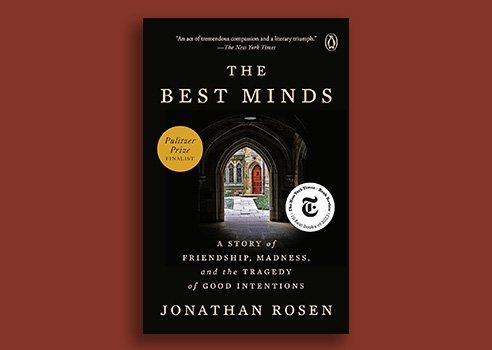Reading time: About 2 minutes
I like to share interesting pieces of figurative language I encounter in my reading. I write today about similes and metaphors from Jonathan Rosen…
I have mixed feelings about a new memoir by Jonathan Rosen.
On the one hand, I believe The Best Minds explores important societal questions about serious mental health problems like schizophrenia. And it’s exceptionally well written. On the other, I’m not convinced he had the right to tell the story of his troubled friend Michael Laudor.
Laudor was a wunderkind, who graduated summa cum laude in three years from Yale and then landed a consulting job with Bain and Company. Then, he suffered a serious psychotic break and was diagnosed with paranoid schizophrenia. He was still in the hospital when he learned Yale Law School had accepted him into their prestigious program. And he graduated while still battling delusions.
After the New York Times featured his story in a laudatory profile, Laudor sold his memoir for a large sum and director Ron Howard bought the film rights. But subsequently, Lauder stabbed his girlfriend to death with a kitchen knife. To this day, he remains institutionalized in the Mid-Hudson Forensic Psychotherapy Center in New Hampton, New York.
The story is gripping and Jonathan Rosen tells it with the skill and panache of a novel novelist. Here are my favourite examples of his figurative language:
- I knew the president was a crook, but Michael knew who Liddy, Haldeman, and Ehrlichman were, and what they had done, matters he expounded as if Deep Throat had whispered to him personally in the schoolyard just behind his house.
- My father could pinpoint an accent and locate the sorrow behind it the way Sherlock Holmes could spot a limp and account for the accident that caused it at a glance.
- The book piles rose like stalagmites from tables, chairs, and the floor itself.
- Even his name, Chuck, was a verb.
- [I] adopted Michael’s habit of taking a bite [of pizza] immediately even though molten cheese adhered like napalm to the roof my mouth and I was never sure if I was dislodging mozzarella from behind my braces or a small piece of my own seared flesh.
- He had a ceremonious way of dealing slices of white bread and squares of American cheese like double hands of blackjack when he made us open-faced gilled cheese.
- Cybele would find him settled on the red couch in her living room, talking to her parents the way he talked to mine, as if auditioning for adoption.
- He dropped the cello and took up the guitar, that skeleton key that opens all teenage doors.
- It was like opening the front door to get a newspaper and finding a meteorite on your lawn.
- He never wrote in script but printed in speedy block letters, his large hand moving the pen with stop-and-go fury like a cabdriver driving with the brake on.
- The one time I’d caught a glimpse of Michael, he was walking a few steps behind his father, who looked like General MacArthur returning to the Philippines.
- We carried the world of each other’s childhood in our pockets like a kryptonite pebble, a fragment of the home planet.
- Michael informed me that he had decided to become rich, as if it were something you could declare, like a major.
- He received “custodial care,” which made him sound like a piece of furniture to be dusted.


